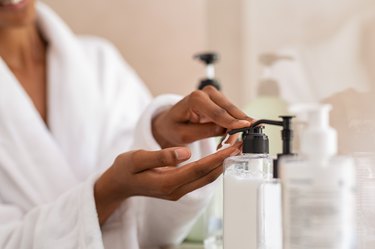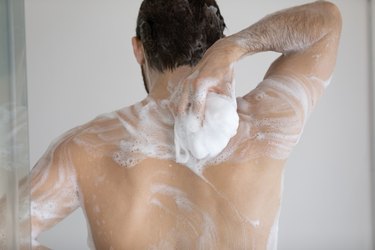
It's fine to give your arm or back a quick scratch when you're out and about. But an itchy nipple? Not so much. Thing is, the area can be surprisingly prone to irritation. So if you're dealing with itching or dryness that won't ease up, you'll want to find a way to solve the problem stat.
"It's not uncommon for nipples to be a site of skin inflammation," says Beth Goldstein, MD, a Durham, North Carolina-based dermatologist and Modern Ritual founder. "The skin is thin and susceptible to dryness, low humidity and irritating fabrics. Stress in any form can trigger itching."
Video of the Day
Video of the Day
Plus, like any part of your body, nipples can itch for a variety of reasons. Here's a look at some of the most typical triggers for itchy nipples and what you can do to find relief:
Your Skin Is Dry
Parched skin can be itchy, tight, scaly or flaky in general. And since nipple skin is so thin, it can be particularly prone to dryness, Dr. Goldstein says.
Sometimes dry skin can be related to an underlying condition like eczema (more on that later), but other times, it's just a matter of an arid environment. Cold, windy conditions can dry out your skin, as can central heating and space heaters, since they zap humidity from the air, according to the Mayo Clinic. Being overzealous with bathing is another culprit, since hot water can strip skin of its natural hydrating oils.
Fix it: Try common remedies for dry skin, such as avoiding long, hot showers, running a humidifier and using lotion.
You're Dealing With Chafing
Rubbing up against rough fabrics, especially when you're active, can cause nipple skin to become chafed and irritated, Dr. Goldstein notes. For some people, that soreness might translate to itching.
Fix it: For activewear, look for bras or tops made of soft, smooth fabric, such as synthetic materials that are smoother than cotton and are sweat-wicking. For focused activity, choose bras or tops designed for your specific sport, recommend the National Institutes of Health (NIH). You can also apply petroleum jelly, baby powder or an anti-chafe stick (which can be less messy) to chafed nipples while they heal — these act as a barrier to minimize irritation.
You're Having an Allergic Reaction
Recently started using a new laundry detergent, soap, lotion or even began wearing a different kind of fabric? If the skin around your nipples is red, itchy, swollen, flaky or burning, you might be dealing with a case of contact dermatitis, according to the Cleveland Clinic. These allergic reactions can occur when skin comes in contact with an irritant.
Fix it: While these allergic reactions can be uncomfortable, they will typically clear up within a week or two as long as you steer clear of whatever caused the rash. If you've tried a new body product or detergent, see if the itchiness abates when you stop using it. If you're not sure of the cause, you can visit a dermatologist or allergist for testing.
You Have Eczema
About 20 percent of itchy, rash-prone nipples are caused by underlying eczema, Dr. Goldstein notes. If you're experiencing an eczema flare, your nipples might be dry or inflamed, feel itchy or painful or have discharge. It's also common to develop a patchy or crusty rash or small bumps that ooze fluid, notes the Cleveland Clinic.
Fix it: While eczema is an incurable condition, there are some strategies that can help alleviate itchy nipples. These including moisturizing, taking corticosteroids (either topically or orally), avoiding triggers and phototherapy (aka light therapy), per the Cleveland Clinic.
Your Nipple Piercing Is Irritated
It's not uncommon for a new nipple piercing to itch while your skin heals, Dr. Goldstein says.
But if the problem doesn't seem to be easing up or you notice the itching starts after trying a new piece of jewelry, you're probably dealing with an allergic reaction to the jewelry metal, she notes. Nickel is notorious for making skin red and itchy, but chromium, copper and cobalt can also cause problems.
Fix it: Some itching is normal during the healing process, according to the Association of Professional Piercers (APP). That is, you may just need to wait it out. If you're allergic to the jewelry's material, you may need to remove the nipple ring. Reach out to a professional to swap out jewelry, per the APP. If you have signs of an allergic reaction, such as hives or swelling, or have a fever, swelling or other signs of an infection, you should get in touch with your doctor, according to Peace Health.
You're Pregnant
Shifting hormones and stretching skin during pregnancy can make you more prone to itchy, sensitive skin. And your nipples are no exception, says Ohio-based ob-gyn and Medzino medical advisor Kimberly Langdon, MD. While mild itchiness during pregnancy isn't usually cause for concern, pay attention if your itching becomes intense, especially when you're trying to sleep, according to the Mayo Clinic. These could be signs of a cholestasis of pregnancy, a serious complication that requires medical attention.
Fix it: Try avoiding soap on your nipples, which can dry them out, according to Sutter Health. Using unscented lotion and avoid lengthy exposure to hot water can also help alleviate itchiness, per Sutter Health.
You're Breastfeeding
Itchy nipples might stick around after pregnancy if you're nursing. "Breastfeeding can make nipples itch as milk dries on them," Dr. Langdon says. Dry, cracked nipple skin — which is common in the early days of breastfeeding — can contribute to itching too.
Fix it: If the skin on your nipples is flaking and scaly as well as itchy, it could be a sign of an infection, per Mount Sinai. Your doctor can recommend treatment options. If you don't have these symptoms, try avoiding soaps and placing breast milk on your nipples after nursing to care for your nipples while breastfeeding, per Mount Sinai. When nipples are cracked, you can rub lanolin on them after feeding, according to Mount Sinai.
You — or Your Baby — Have a Yeast Infection
If you're breastfeeding, itchy or cracked nipples accompanied by a feeling of deep, stabbing pain in your breast could be the sign of a nipple yeast infection. Cracked or broken skin around the nipples can make them more prone to becoming infected, as can warm, moist environments (like a milk-dampened bra), the Cleveland Clinic notes. If your baby has an oral yeast infection, called thrush, the fungus from their mouth can also get passed on to your nipples.
Fix it: Try applying a topical antifungal medication to your nipples, per the Cleveland Clinic. If your baby has oral thrush, they'll need to be treated as well, according to the Cleveland Clinic. Your health care provider can recommend an appropriate treatment.
You're Going Through Menopause
Menopause can make your nipples itchy too, Dr. Langdon says. As your body's levels of the hormone estrogen drop, skin becomes drier and thinner. That can make it more prone to itching and irritation.
Fix it: The at-home remedies noted for dry skin — such as moisturizing and avoiding harsh soaps — may help ease this itchiness.
Serious Causes of Itchy Nipples
Itchy nipples aren't usually a sign of a major health problem. But it's possible that an itchy or scaly breast rash could be a sign of certain breast cancers including inflammatory breast cancer or Paget's disease, Dr. Goldstein notes. These cancers are rare, but if your nipple or breast symptoms aren't going away, it's important to have them checked out, especially if there are changes in the look of your nipples or breasts or if you feel any underlying lumps or bumps.
How to Treat Itchy Nipples
You can often manage itchy, irritated nipples just like other types of dry skin. Depending on what's causing your discomfort, these soothing strategies may help.
- Apply an anti-itch cream. Slathering on an anti-itch ointment containing 1 percent hydrocortisone can ease itching fast. Try Aveeno 1% Hydrocortisone Anti-Itch Cream ($10.84, Amazon) or one of these picks. Hydrocortisone is safe to use in small amounts if you're breastfeeding, but be sure to clean your nipples thoroughly before you actually nurse so your baby doesn't ingest any of the ointment, according to the U.S. National Library of Medicine. Be gentle because excessive cleaning and rubbing of the nipples can worsen chafing and exacerbate a rash or itching.
- Try a cool, damp cloth. If you don't have an anti-itch ointment handy or would prefer not to use one, this can also ease itching.
- Use a nipple balm if you're breastfeeding. A moisturizing balm can keep nipple skin supple and hydrated, reducing the risk for dryness, cracking and irritation. Try Earth Mama Organics Organic Nipple Butter ($12.59, Amazon).
- Keep baths or showers short. Just dealing with a case of dry skin? Limit your baths and showers to 5 to 10 minutes max and stick with warm water instead of hot, recommends the Mayo Clinic.
- Apply a heavy-duty moisturizer. A thick ointment or cream will lock in hydration after bathing and protect your skin from the elements. Pick an option that's fragrance-free if you're prone to irritation, like CeraVe Daily Moisturizing Lotion ($12.10, Amazon).
- Run a humidifier. A humidifier adds moisture to indoor air to help combat dryness, especially in the winter. Try one of these expert-recommended picks.
- Look at your personal care products and detergents. Suspect a new soap, lotion, fragrance or detergent is making you itchy? Stop using it and see how your skin responds. If the itching clears up, you've found your culprit.
- Choose the best bra fabrics for your activity. Cotton is gentle and breathable and may be the most comfortable option for everyday wear, but for activewear, a soft, moisture-wicking material is better than cotton.
When to See a Doctor
There's a good chance your itchy nipples will ease up with at-home measures. But if those changes aren't doing the trick, let your doctor or dermatologist know. Reach out to your doctor, too, if nipple itching is associated with signs of a possible infection, like a rash, oozing, crusting or fever or if you notice any significant changes in your nipples or breasts, especially if you feel lumps or bumps.
- Mayo Clinic: "Dry Skin"
- National Institutes of Health, National Library of Medicine, Medline Plus: "Chafing"
- Cleveland Clinic: "Contact Dermatitis"
- Mayo Clinic: "Cholestasis of Pregnancy"
- Cleveland Clinic: "Nipple Yeast Infection"
- National Library of Medicine: "Hydrocortisone, Topical"
- Association of Professional Piercers: "SUGGESTED AFTERCARE FOR BODY PIERCINGS"
- Peace Health: "Body Piercing Problems"
- Sutter Health: "Skin Changes and Conditions"
- Mount Sinai: "Breastfeeding - skin and nipple changes"
Is this an emergency? If you are experiencing serious medical symptoms, please see the National Library of Medicine’s list of signs you need emergency medical attention or call 911.


